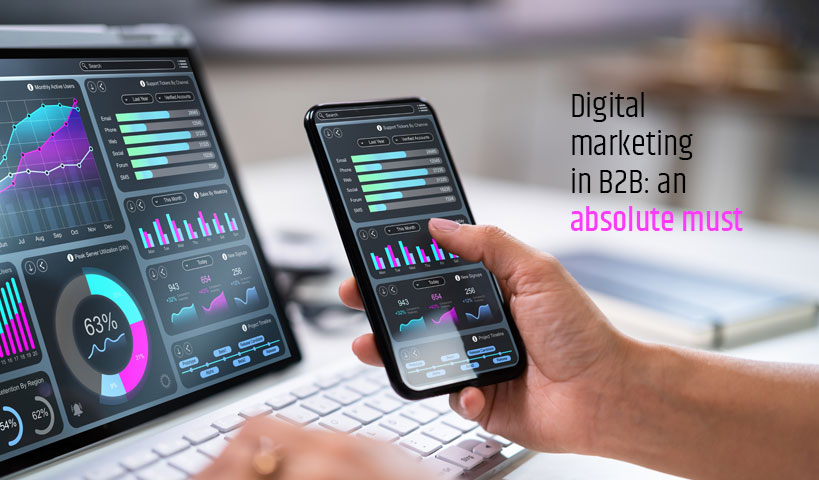
B2B marketing is undergoing a major transformation in an increasingly digital world. Companies are no longer content to follow traditional methods to reach their business customers. They are now adopting sophisticated B2B digital marketing strategies. And they’re doing so to stay competitive and meet the expectations of an increasingly well-informed customer base.
Do you agree with this premise? Well, for us it’s a kind of Lapalissade of the digital world. In this ExoB2B post, we’ll explore why it’s become essential for companies to do B2B digital marketing. We’ll highlight the benefits and useful tools. But also best practices for maximizing the impact of marketing strategies and campaigns, while emphasizing the importance of accurate measurement. Also on brand development and the use of artificial intelligence (AI). That’s right… A must in 2024…
On the necessity of adopting digital marketing in B2B
Digital marketing enables companies to overcome geographical constraints and reach niche markets with great precision, no matter where they are. Using tools such as search engines, social networks, e-mailing and online advertising campaigns, companies can target potential customers. This opens up significant growth opportunities. Particularly for SMEs that don’t always have the resources to participate in international trade shows.
One of the key benefits of digital marketing is the ability to precisely measure campaign performance. Tools such as Google Analytics, marketing automation platforms and customer relationship management (CRM) tools such as Zoho CRM, enable every customer interaction to be tracked. But also to measure return on investment (ROI) and adjust strategies in real time. This contrasts with traditional methods, where it’s often difficult to quantify the exact impact of marketing efforts.
The importance of KPIs in Digital marketing in a B2B context
Key performance indicators (KPIs) play a crucial role in assessing the success of digital marketing. Companies can gain valuable insights into the effectiveness of their marketing efforts. How can they do this? By tracking metrics such as conversion rate, cost per acquisition (CPA), acquisition channels (organic, PPC, email) and return on investment (ROI). For example, a sales lead generation campaign can be adjusted in real time according to the data collected. This optimizes results and maximizes budget efficiency.
Digital B2B brand development
Digital plays an equally important role in developing and strengthening the B2B brand. By using digital channels, companies can create and maintain a consistent and engaging brand presence. High-quality content, such as blog posts, webinars, and educational videos, help position the company as a thought leader in its field. In addition, social networks offer a platform for direct interaction with customers and prospects. This strengthens the brand’s recognition and loyalty.
Personalization and advanced targeting
Digital marketing enables far more precise personalization and targeting than traditional methods. Companies can segment their audience according to specific criteria. (Not hair color … yet 🙂 ) Thanks to automation tools and analytical data, it’s possible to create tailor-made campaigns. Campaigns that meet the specific needs of each customer segment. This increases conversion rates and customer engagement.
Audience segmentation enables companies to personalize their marketing messages. This is based on the needs and preferences of each target group. For example, a company selling project management software can create specific campaigns for large corporations, SMEs and start-ups. This personalized approach improves engagement and increases the chances of conversion.

Artificial intelligence and conversational agents
Artificial intelligence (AI) is playing an increasingly important role in B2B marketing. The AI-based ChatGPTs of this world can analyze vast quantities of data. This enables trends and insights to be identified that would otherwise be difficult to detect. What’s more, AI can be used to automate and optimize marketing campaigns. To, improve performance, enhance personalization, and predict customer behavior.
Conversational agents, or chatbots in Chinese 🙂 can offer instant assistance to visitors to your company’s website. And answer their questions and guide them through the purchasing process. What’s more, AI-powered marketing automation platforms can automatically segment audiences. Personalize messages and optimize campaigns in real time to maximize results.
Attract qualified sales leads
Digital marketing strategies, such as content marketing and SEO, help attract qualified sales leads. They provide relevant, high-quality information. B2B buyers are actively looking for solutions to their problems. And information to help them make informed purchasing decisions. By producing rich, educational content, such as webinars, white papers or case studies, companies can attract prospects who are already interested in their products or services.
Social networks: ongoing engagement with customers
Digital platforms enable ongoing dialogue with customers throughout the sales cycle. Blogs in particular, as well as newsletters and social networks, offer ways of staying in touch. And, of course, to provide regular updates and valuable information. This constant engagement helps companies to stay present in customers’ minds, strengthening relationships and fostering long-term loyalty.
Social networks play a substantial role in maintaining customer engagement. Read here about LinkedIn, THE socio-professional network par excellence. By regularly publishing relevant content and interacting with subscribers, companies can create a community around their brand. For example, a company can use LinkedIn to share blog posts. But also case studies and customer testimonials, reinforcing its credibility and authority in its sector.
Note here that we mean sharing on social networks content previously created and distributed on the company’s platforms. If possible, avoid creating content directly on LinkedIn, Facebook or other platforms.

Best practices for maximum impact
To maximize the impact of B2B digital marketing strategies, it’s important to follow certain best practices. Here are five tips we consider essential:
1- Use data to inform decisions: use analytics tools to gather information on customer behavior and campaign performance, and use this data to adjust and optimize your strategies.
2- Personalize messages: personalization is essential to capture your audience’s attention. Use marketing automation tools to create personalized messages that resonate with the specific needs of each segment of your audience.
3- Test and optimize: digital marketing is an iterative process. Test different approaches, measure the results and optimize your campaigns accordingly. A/B testing, for example, can help you identify which elements of your campaigns generate the best results.
4- Invest in quality content: content is king in digital marketing. Invest in the creation of high-quality content that brings value to your audience. Informative blog posts, in-depth case studies and engaging webinars are all ways of captivating and convincing B2B decision-makers.
5- Always optimize your content for search engines (SEO): SEO optimization is crucial to attracting organic traffic to a company’s website. This includes using relevant keywords, creating quality content, and obtaining backlinks from important, credible sites. Good SEO improves online visibility and attracts qualified sales leads.
Conclusion
B2B marketing in a digital context is no longer an option, but a necessity to remain competitive in an ever-changing marketplace. Digital offers unprecedented opportunities to reach a wider audience, personalize communications, and accurately measure campaign results.
By adopting the right tools and following best practices, companies can not only attract and convert more customers, but also build lasting, profitable relationships. The future of B2B marketing is decidedly digital, and companies need to adapt to take full advantage of it.
Thanks to its expertise, ExoB2B knows how to design effective strategies and campaigns adapted to the realities of the B2B world. To find out more, or to request our services, contact us!




